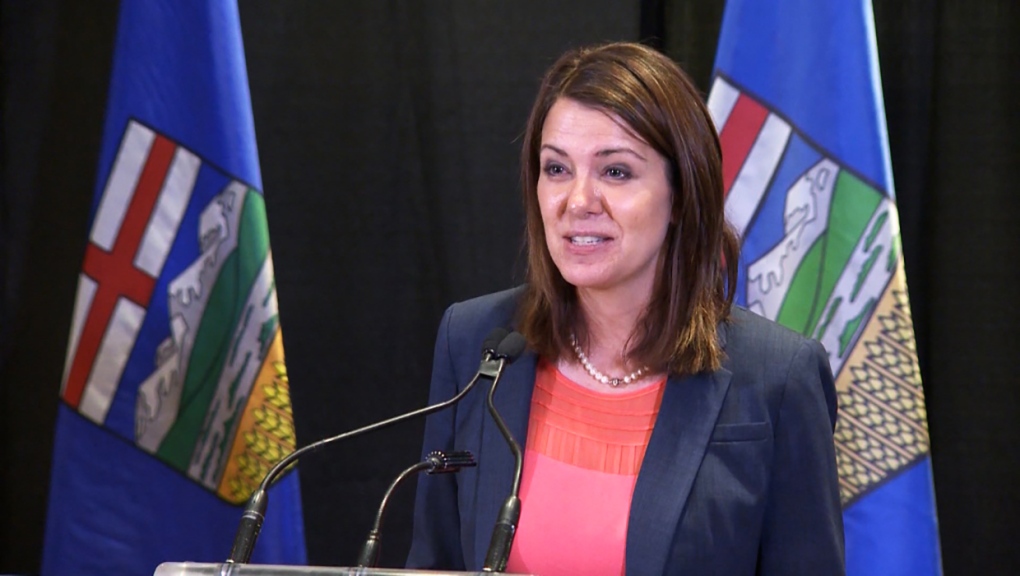
COVID-19 vaccine policy for Arctic Winter Games not due to Alberta influence: official
 Smith says she plans on restructuring all of Alberta Health Services, including firing the AHS board, by year end.
Smith says she plans on restructuring all of Alberta Health Services, including firing the AHS board, by year end.
An official with the Arctic Winter Games says its decision to revoke a mandatory COVID-19 vaccine policy for the upcoming event had nothing to do with pressure from the Alberta government, despite claims by the premier.
The Arctic Winter Games International Committee announced Nov. 18 it was dropping the vaccine requirement for attendees at the 2023 Games in the Regional Municipality of Wood Buffalo in northeastern Alberta to "align with current public health advice."
Premier Danielle Smith recently told reporters during an unrelated press conference that the government had challenged the policy when the Games requested $1.2 million in support as an example of how she was "calling people" to stand up for the unvaccinated in the province.
"They were discriminating against the athletes, telling them they had to be vaccinated," she said. "So we asked them if they would reconsider their vaccination policy in the light of new evidence and they did. And I was pleased to see that."
But committee president John Rodda said he's not aware of the phone call Smith mentioned. He said three years ago, Alberta Sport Connection, which has since dissolved, granted $1.8 million to the Wood Buffalo host society.
"There was nothing contingent on any policy mandates," he said.
Rodda said the decision on the vaccine policy was based on advice from health officials and discussions with other sporting organizations.
"There was no other external influence that forced us to make a decision," he said. "We realize that things have changed and they've been relaxed and that's how we came to our conclusion."
The Games committee has said it supports any jurisdiction that wishes to enforce its own vaccine requirements and encourages protective measures like mask-wearing and sanitizing.
Smith's office did not immediately respond to a request for comment.
During her first day as premier last month, Smith made headlines when she said unvaccinated Canadians were the most discriminated against group she'd witnessed in her lifetime. She subsequently issued a statement saying she "did not intend to trivialize" the discrimination faced by minority communities and persecuted groups.
“We just want to remind people that in this province we do not discriminate against people for any reason and that now that we know a lot more about this virus that we would like them to address their policies and bring them up to speed with what the environment is here that we are trying to create, which is a welcoming environment," Smith said following her comments about the Arctic Winter Games.
The Games are a premier circumpolar sport and cultural event for youth that began in 1970 and are usually held every two years. Athletes from the Northwest Territories, Yukon, Nunavut, Alaska, Greenland, Nunavik in northern Quebec, and northern Alberta, as well as Indigenous Sami people of Norway, Sweden and Finland are to compete at the Games in Wood Buffalo from Jan. 29 to Feb. 4.
Athletes primarily range in ages from 10 to 19, depending on the category and sport, with young adults also competing in Arctic sports and Dene games.
The Games were cancelled in March 2020, just days before they were set to begin in Whitehorse, due to concerns with COVID-19. The Wood Buffalo event was originally scheduled to take place in March 2022 but it was postponed due to the pandemic. The Games in Mat-Su Valley, Alaska, have been set for March 2024.
"We're going back-to-back so there's quite a buzz," Rodda said. "There's more enthusiasm and excitement and energy where we're back doing what we all love to do and that is provide opportunities for northern youth."
This report by The Canadian Press was first published Nov. 30, 2022.
CTVNews.ca Top Stories

LIVE UPDATES Rain reduces wildfire activity, aids firefighters: Jasper park officials
Jasper National Park officials said Thursday night that rain over the day resulted in "minimal fire behaviour and spread."
Canadian Olympic Committee removes women's soccer team's head coach over drone scandal
The Canadian Olympic Committee has removed women's national soccer team head coach Bev Priestman over a drone scandal, according to a press release from the organization.
Yukon woman narrowly escapes bear attack, credits hair clip
A woman in Yukon believes her hair clip helped save her during a bear attack.
Prince William's 2023 salary revealed in new report
Newly released financial reports show that William, the Prince of Wales, drew a salary of $42.1 million last fiscal year, his first since inheriting the vast and lucrative Duchy of Cornwall.
'I was just shocked': Jasper lodge owner on seeing property destroyed by wildfire
On Wednesday night, the owner of Maligne Lodge in Jasper, Alta., was shocked to receive a photo of her business engulfed in flames.
Mary-Ellen Turpel-Lafond likely has Indigenous DNA: report
The Law Society of British Columbia says a DNA test shows a former judge and Order of Canada recipient accused of falsely claiming to be Cree "most likely" has Indigenous heritage.
U.S. authorities have arrested 'El Mayo' Zambada, a historic leader of Mexico's Sinaloa cartel
Ismael 'El Mayo' Zambada, a historic leader of Mexico's Sinaloa cartel, and Joaquin Guzman Lopez, a son of another infamous cartel leader, were arrested by U.S. authorities in Texas on Thursday, the U.S. Justice Department said.
Harris pushes Netanyahu to ease suffering in Gaza: 'I will not be silent'
U.S. Vice President Kamala Harris pressured Israeli Prime Minister Benjamin Netanyahu on Thursday to help reach a Gaza ceasefire deal that would ease the suffering of Palestinian civilians, striking a tougher tone than President Joe Biden.
'She led it the whole way': 18-year-old B.C. woman leads hikers to safety in Jasper National Park
As fire threatened people in Jasper National Park, Colleen Knull sprung into action.

































